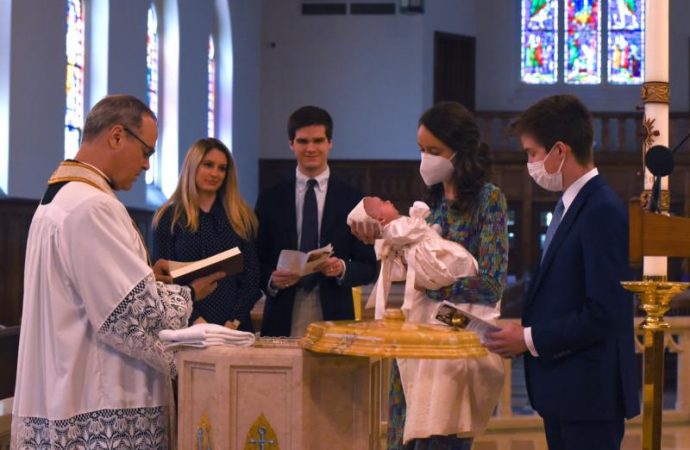
By Dennis Sadowski
CLEVELAND (CNS) — The chairman of the U.S. bishops’ Committee on Divine Worship has sent a memo to fellow bishops offering links to resources for parishes to review as they prepare to offer the public celebration of Mass and the sacraments.
The May 14 memo from Archbishop Leonard P. Blair of Hartford, Connecticut, references resources from the Thomistic Institute, the Catholic Medical Association and the Federation of Diocesan Liturgical Commissions.
Archbishop Blair’s latest correspondence follows an April 30 memo in which he suggested bishops consider guidelines developed by a working group at the Thomistic Institute at the Dominican House of Studies in Washington.
He told the bishops the purpose of sharing the first two resources “is primarily medical in nature.”
“As we proceed in a manner that respects the matter and form of the sacraments and liturgical norms, these guidelines specify the medical considerations that need to be taken into account, even as there is disagreement on some points of a prudential nature,” he wrote in the memo.
The third resource offers liturgical issues for consideration by parish and diocesan planners.
The Thomistic Institute and Catholic Medical Association documents review the need for social distancing in pews, requirements that Massgoers wear facial protection, ensuring the protection of priests, deacons and extraordinary ministers of the Eucharist, and the safe distribution of Holy Communion.
Safe practices are necessary, according to all three sources, as bishops face having to balance public safety while maintaining the respect and reverence of the Eucharist and the liturgical and sacramental symbolism of Mass rites.
The nine-page Catholic Medical Association resource, developed by its Ad Hoc Committee of Catholic Doctors, reviews much of the guidance offered by public health officials designed to mitigate the spread of COVID-19, the illness caused by the novel coronavirus.
“Safest practices should be created with input from medical experts,” the association’s resource said. “These practices will likely evolve as the pandemic unfolds, and will vary based on ongoing local, regional and national risk assessments.”
The 12-page offering from the FDLC offers lists of issues to consider as parishes prepare to reopen for public worship.
It opens with a list of general considerations, noting that “the common good is our priority.”
In subsequent pages it offers practical steps to ensure safety and hygiene, including the use and disposal of holy water, regular cleaning of vestments, keeping church decorations in line with the season but also to a minimum, and sanitizing high-touch areas after each liturgy.
Other considerations are offered under the titles of social distancing, guidelines for the first Sunday of reopening and liturgical considerations. It also has links to various public health organizations that can offer guidance for parishes to follow to ensure worshippers’ safety.
The Thomistic Institute’s Working Group on Infectious Protocols for Sacraments and Pastoral Care April 28 released guidance on a wide list of practices that would maintain the integrity of liturgy and the distribution of Communion. It has been referenced twice by Blair.
Archbishop Blair cited one particular point that has been raised by some medical professionals regarding the use of cotton balls to administer the chrism oil in the sacrament of confirmation. He said the U.S. Conference of Catholic Bishops’ Secretariat of Divine Worship “expressed some serious reservations” about the practice, referring the doctrinal question to the Vatican’s Congregation for Divine Worship.
The congregation, the memo said, “replied that a dubium submitted … would be appropriate so that the question can be studied and an authoritative answer given. A dubium is therefore being sent to Rome.”
“The Secretary of the Congregation, Archbishop (Arthur) Roche, advised great prudence and caution in the celebration of the sacraments under the present circumstances,” the memo said.
